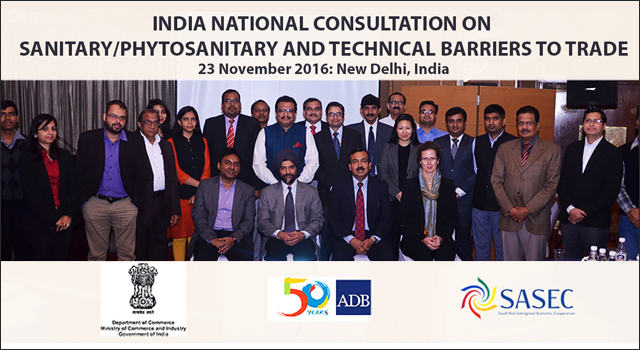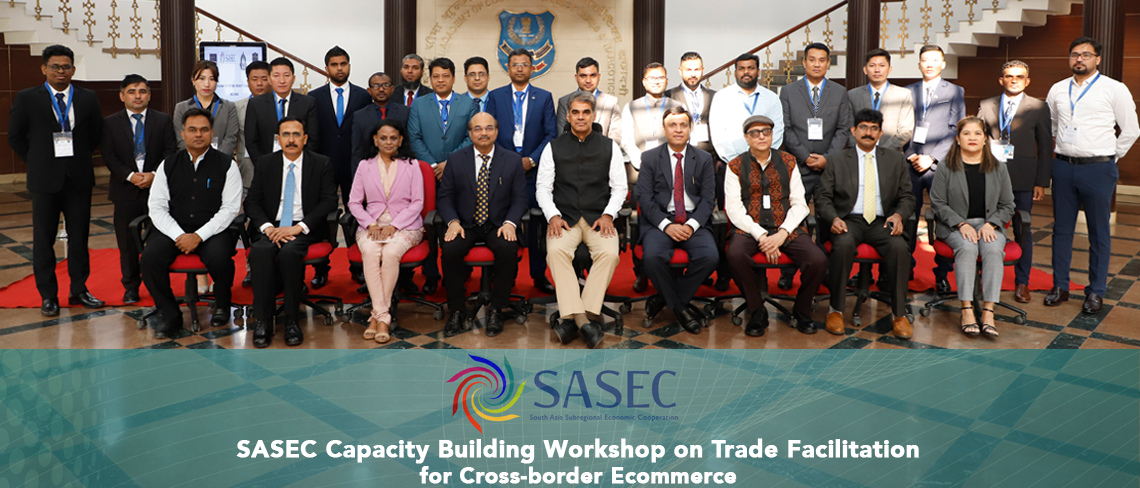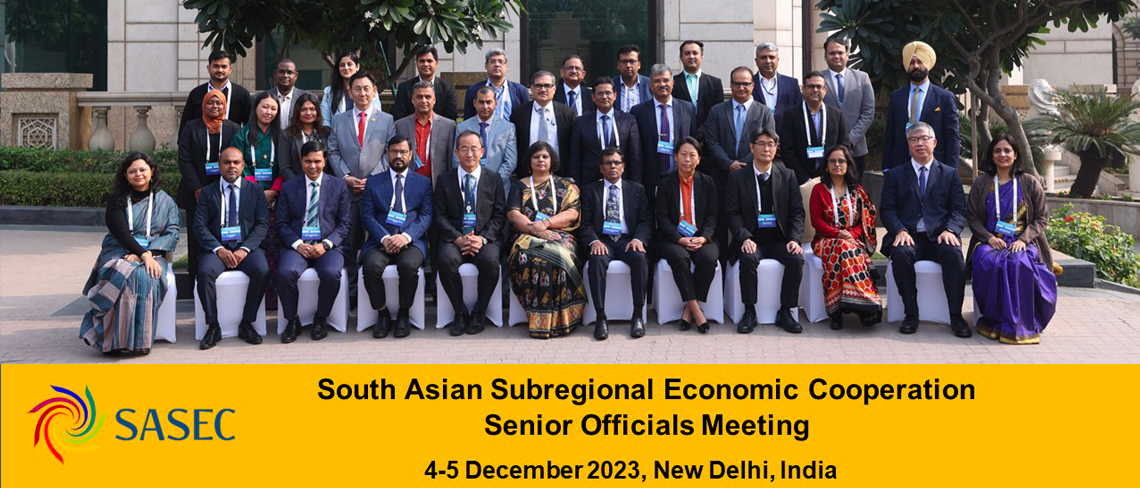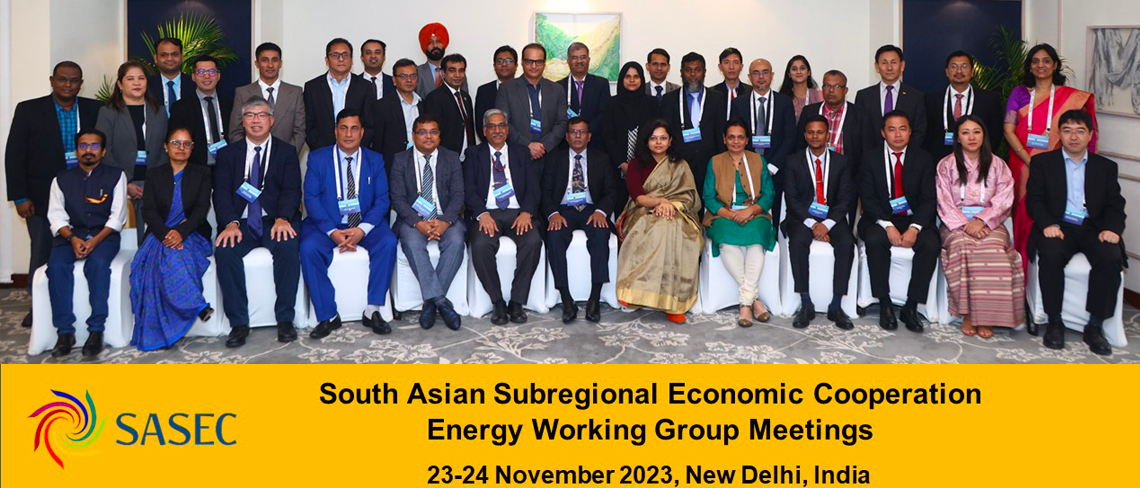
India: National Consultation on Sanitary/Phytosanitary and Technical Barriers to Trade
23 Nov 2016

India's Ministry of Commerce and Industry, together with the Asian Development Bank (ADB), conducted a national consultation meeting on sanitary/phytosanitary (SPS) and technical barriers to trade (TBT) on 23 November in New Delhi, India, in preparation for launching a national SPS/TBT diagnostic study, under the trade facilitation agenda of the South Asia Subregional Economic Cooperation (SASEC) Program.
Outcomes of the meeting included
- Agreement on an adjusted terms of reference for the national SPS/TBT diagnostic study in India, including a tentative schedule;
- Agreement on the working arrangements for the India SPS/TBT Focal Point and Core Group with all involved stakeholders for preparation of the national diagnostic study;
- Confirmation of next steps for launching the national SPS/TBT diagnostic study.
Discussion on the terms of reference for the national SPS/TBT diagnostic study included the possibility to expand coverage of the study to include products that span a certain percentage of trade; the need to clearly identify specific international standards including best practices for the gap analysis; the need to consider practical difficulties in establishing laboratories and certification facilities at each border point; and a preference to focus on the North Eastern region and the southern States of India, while developing common infrastructure in the region.
Mr. Bhupinder S. Bhalla, Joint Secretary (FT-South Asia), Department of Commerce, India, Chaired the Consultation Meeting and delivered welcoming remarks, in which he highlighted the trade volumes of India with the other SASEC countries worth US$18.1 billion, and the zero-duty access given by India under the South Asian Free Trade Area to Least Developed Countries. Noting the large untapped potential for trade in the region, he underscored the need to bridge the differences in standards as well as capacities in the region, and for the SASEC SPS/TBT diagnostic study to evolve a set of recommendations to take forward the SPS/TBT agenda.
Mr. Sudhanshu Pandey, Joint Secretary, Department of Commerce also delivered remarks that acknowledged the importance of SPS/TBT issues in the context of trade facilitation and emphasized the need to identify products traded significantly in the region, and work on harmonizing their standards. He also noted the need to build networks of institutions involved in standard setting and conformance assessment in the region.
Mr. Pawan Agarwal, Additional Secretary and Chief Executive Officer, Food Safety and Standards Authority of India, expressed his commitment to supporting the other countries in South Asia in the areas of food regulation, standard setting and mutual recognition.
Dr. Murali Kallummal, Associate Professor, Centre for WTO Studies, Indian Institute of Foreign Trade, India, made presentations on the status of India’s initiatives in TBT and in SPS measures. On TBT measures, he explained the regulatory regime of the Bureau of Indian Standards and the system of conformance assessment followed in India. Focusing on trends in TBT notifications in the region as well as under the ASEAN-India FTA, he highlighted that even as tariffs have decreased, TBT notifications have remained constant or have increased marginally, with a majority being under consumer health. The lack of timely notification by some other countries in the region was also highlighted. On SPS, Dr. Kallummal explained the institutional set-up and legal framework and shared information on the SPS nodal points in India. He also laid out issues pertaining to non-participation and non-representation in relevant international standard-setting bodies; the absence of a national notification system by a common enquiry point; lack of harmonisation in procedures; the alignment of Indian standards with international standards; and a general lack of awareness within industry on SPS measures.
Dr. Selim Raihan, ADB international consultant and coordinator for the overall SPS/TBT diagnostic study project, presented the draft terms of reference for the national diagnostic study. He clarified objectives, methodology, and detailed tasks of the Indian national diagnostic study, as well as guiding discussion on adjustment of the terms of reference.
The Consultation brought together various government ministries and agencies, including the Department of Commerce; the Food Safety and Standards Authority of India; Ministry of Environment and Forest; the Central Board of Excise and Customs; the Directorate of Plant Quarantine; Department of Agriculture, Dairying and Fisheries; Bureau of Indian Standards; the Agricultural and Processed Food Products Export Development Authority; as well as representatives of the private sector such as the Indian Chamber of Commerce; the Federation of Indian Chambers of Commerce and Industry; Council for Leather Exports; Confederation of Indian Textile Industry; and the Federation of Indian Export Organisations.
In November 2013, the six SASEC member countries conducted a brainstorming meeting where they agreed to coordinate and develop an agenda in SPS/TBT under the SASEC Program. The brainstorming session was followed by a focused meeting in December 2014 that identified the next steps to move this agenda forward, including the development of a terms of reference for national-level and regional SPS/TBT diagnostic studies to be undertaken by all six SASEC countries.
The SASEC SPS/TBT national diagnostic study in all six countries is funded through ADB technical assistance activities.









